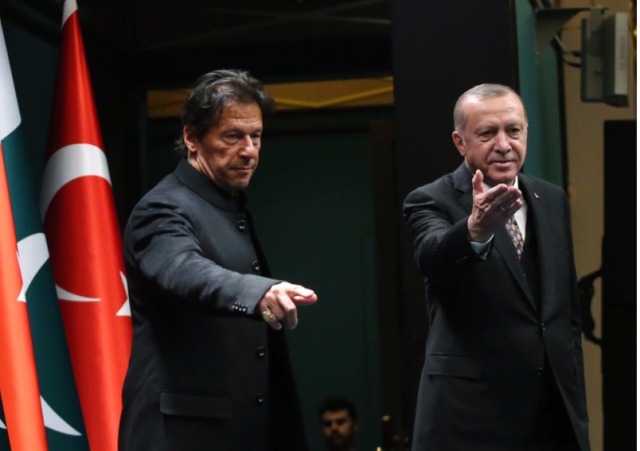 Pakistan's Prime Minister Imran Khan and Turkish President Recep Tayyip Erdoğan. [photo: Pakistan Embassy, Ankara]
Pakistan's Prime Minister Imran Khan and Turkish President Recep Tayyip Erdoğan. [photo: Pakistan Embassy, Ankara]
[This is an excerpt from a research article in the current edition of The Round Table: The Commonwealth Journal of International Affairs.]
Pakistan and Turkey have signed another high-profile deal in which Turkish company Savunma Teknolojileri Muhendislik ve Ticaret (STM) will upgrade the Pakistani navy’s three Agosta Khalid class submarines. The total cost of three Agosta 90B air-independent propulsion (AIP) submarines was US$350 million. The officials mentioned ‘an important defence project that will go a long way in enhancing operational capabilities of existing submarines of Pakistan Navy, besides strengthening defence relations between two brotherly countries’ (“Turkish Firm to Upgrade Pakistan Submarines”). The Turkish company has pledged that the first upgraded submarine will be delivered within 45 months of the signing of the agreement. The other two will take place 12 months after the first one. Labelled a ‘Mid-Life-Update’, ‘the upgrade is primarily concentrated in changing the submarine’s electronic subsystems, such as its sonar, radar, combat management system (CMS), electronic intelligence (ELINT) or passive sensors and the like’ (“Details of the Pakistan Navy’s Agosta90B”).
In 2018, Pakistan and Turkey signed another noteworthy deal worth USD 1.5 billion to buy 30 T129ATAK helicopter gunships. This project is playing a vital role in the Turkish defence industry’s objectives. Initially, it was designed to:
- [m]eet the requirements of the Turkish Armed Forces in this field. It aims to design and produce an effective and advanced attack helicopter capable of carrying a large useful load, resistant to challenging environmental factors, and equipped with state-of-the-art technology target tracking and imaging, electronic warfare, navigation, communications, and weapon systems (“Turkey finally lands its attack helicopters”).
Even so, Ankara faces challenges in delivering the helicopters to Islamabad because its CTS800 engines are American, and licences are not issued for commercial use. In this case, Ankara has delivered 30 ATAK Helicopters to Islamabad without engines. The engines will be provided later, after Turkey buys them from other states such as France and Poland (“Turkey’s ATAK Helicopter Sale”). Turkey has also agreed to provide 34 T-37 helicopters to Islamabad free of cost to enhance Pakistan Air Force’s training capabilities (Mateen Haider). In July 2018, the two states signed a deal worth approximately US 1 USD billion for four ‘MILGEM Class Warships’ to enhance the Pakistan Navy’s defence capabilities. The deal also covers the transfer to Pakistan of all technology and intellectual property in the design of these vessels (“Pakistan Navy signed contract”). The Pakistan navy currently has a total of six ships. With the MILGEM Ada, it will have ten. ‘The first PN corvette will be built in 54 months from the current date, with the remaining three due within 60, 66, and 72 months, respectively’ (“Pakistan inks contract”).
Erdogan visited Pakistan in February 2020; he attached great importance to the strategic partnership between the two countries. Pakistan President Imran Khan and Erdogan agreed to work together to further strengthen defence cooperation. In addition, the two sides also reached consensus on major issues such as Kashmir, the Financial Action Task Force (FATF), and the peace and reconciliation process in Afghanistan. On the Kashmir issue, Erdogan said that India’s approach to this issue ‘aggravates the situation’ and ‘does not bring any benefit to anyone’ (“Erdogan’s visit”). Bilateral relations between the two countries remain strong, but Erdogan stressed the need to strengthen ties at the multilateral level. Turkey wants to form a Muslim bloc (Ashraf) Both Imran Khan and Erdogan are deeply influenced by Islam, and they may create a new Islamic order for Muslim countries. This could advance Pakistani strategic goals such as a peaceful resolution to the Kashmir issue. The relationship between the leaders is stronger than ever, as Imran Khan also supports Turkey on the Syria issue. They have signed memoranda of understanding (MoUs) to strengthen the economy, trade, and investment.
Conclusion
The relations between Pakistan and Turkey were good even before the 9/11 attacks, but in terms of core security and strategic interests, they were not significant until 2001. Global terrorism has encouraged the two countries to reconsider their mutual interests and shared responsibilities. Both states were already closely linked by religious, political, and cultural factors. Our analysis has yielded a powerful argument that security and strategic interests are the fundamental rationales for this growing relationship. The terrorist attacks on Turkey posed a dangerous threat to its national security and, unsurprisingly, Turkey attempted to sign an anti-terrorism treaty with Pakistan. Islamabad was strategically vital because of its intelligence, as the ISI has more experts than other comparable agencies.
Their relationship has been further strengthened as Turkey attempted to eradicate terrorism and to do so it needed to normalise relations between Pakistan and Afghanistan. It is also in Pakistan’s security and strategic interest to improve relations with Afghanistan. Turkey launched PATTS to strengthen relations between the two countries, but to no avail, mainly because of mistrust and lack of confidence between Kabul and Islamabad. In order to achieve better results, strategic partnerships, flexible consensus, and bilateral crisis management mechanisms are needed. The Turkish-Pak relationship further strengthened because of Turkey’s belief that Pakistan is of strategic importance in achieving its vision for 2023. The two countries clearly attach great importance to maintaining and nurturing their strategic partnership agreement.
Rahat Shah is a post-graduate Student, School of International & Public Affairs, Jilin University, Changchun and Wang Li is the Professor of International Relations & Diplomacy, School of International & Public Affairs, Jilin University, Changchun, People’s Republic of China.



